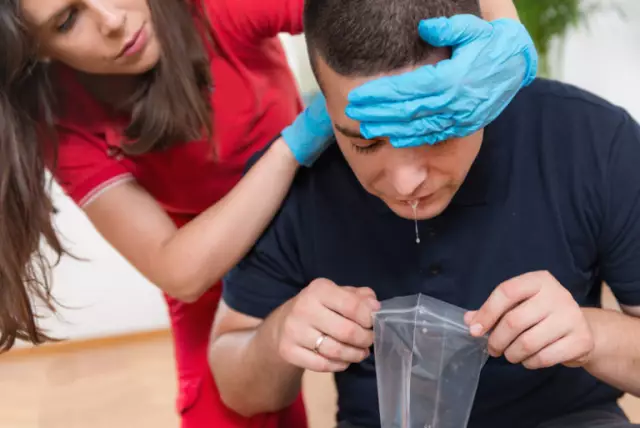- Author Rachel Wainwright wainwright@abchealthonline.com.
- Public 2023-12-15 07:39.
- Last modified 2025-11-02 20:14.
Muscarine poisoning
Muscarine is an alkaloid found in fly agarics. These mushrooms have such a characteristic color that it is almost impossible to accidentally eat them. However, a tincture of fly agarics containing muscarine is used by traditional healers for medicinal purposes, and some people are used to induce drug intoxication. This can lead to serious, life-threatening poisoning.

Source: depositphotos.com
How does muscarine poisoning occur?
Muscarine belongs to quaternary amines, it does not cross the blood-brain barrier and therefore does not affect the central nervous system, but it causes serious dysfunctions of the peripheral nervous system.
Muscarin has a selective excitatory effect on cholinergic receptors, which for this reason are called muscarinic or m-receptors. When they are excited, the blood vessels expand, the smooth muscle fibers spasm, the secretion of the glands increases, and the heart rate decreases. Large doses of muscarine can lead to cardiac arrest in the diastole phase, i.e. in a relaxed state.
In case of muscarine poisoning, the spasm of smooth muscle fibers is so pronounced that in thin people, intestinal peristalsis becomes visible through the anterior abdominal wall. With severe poisoning, bowel contractions lose their undulating character and become chaotic. As a result, diarrhea develops, and stomach cramps cause vomiting.
Against the background of muscarine poisoning, a sharp contraction of the uterus and bladder occurs, so involuntary urination is possible, and in pregnant women, miscarriage or premature birth.
Muscarinic excitation of nerve receptors leads to increased secretion of sweat, lacrimal and salivary glands. It also underlies the development of spasm of accommodation and contraction of the pupil, resulting in visual impairment.
Poisoning symptoms
Symptoms of muscarine poisoning develop 15-30 minutes after ingestion of the poison. These include:
- hypersalivation;
- moist skin;
- nausea and vomiting;
- pronounced redness of the face;
- cramping abdominal pain;
- diarrhea;
- heart rhythm disturbances;
- a sharp decrease in blood pressure;
- breathing disorders;
- convulsions;
- false myopia.

Source: depositphotos.com
First aid for muscarine poisoning
First aid measures are aimed at the speedy elimination of the toxin from the body.
- If the victim is conscious, rinse the stomach. To do this, drink a few glasses of warm water, and then induce vomiting, irritating the root of the tongue. Repeat rinsing until particles of previously taken food are no longer detected in the vomit.
- Take a sorbent (Activated carbon, Smecta, Filtrum STI or any other).
Before the arrival of the doctor, the victims should not be given any other medicines, especially painkillers and antispasmodics, as this can change the clinical picture and complicate the diagnosis.
When is medical attention needed?
In case of mild poisoning with muscarine, the symptoms are not too pronounced, they usually disappear within a day, and the condition of the victims improves. However, it is impossible to independently determine the severity of the poisoning, therefore, it is always necessary to seek medical help if you suspect muscarine poisoning. It is especially important to do this quickly when the poisoning is intense or occurs in a pregnant woman, elderly person or child.
In the hospital, the victims are washed with a gastric tube.
The antidote to muscarine is atropine. The dose and frequency of administration is determined by the doctor, taking into account the degree of poisoning and the individual characteristics of the patient.
In addition to specific therapy for muscarine poisoning, medical correction of existing disorders is carried out.
Possible complications
With severe muscarine poisoning, severe cardiovascular and respiratory failure develops, against which a fatal outcome can occur.
In pregnant women, muscarine poisoning often results in miscarriage or premature birth.
Prevention
For the prevention of muscarine poisoning, active sanitary and educational work with the population should be carried out. It is unacceptable to eat fly agarics, as well as to use preparations from them for self-medication.
YouTube video related to the article:

Elena Minkina Doctor anesthesiologist-resuscitator About the author
Education: graduated from the Tashkent State Medical Institute, specializing in general medicine in 1991. Repeatedly passed refresher courses.
Work experience: anesthesiologist-resuscitator of the city maternity complex, resuscitator of the hemodialysis department.
The information is generalized and provided for informational purposes only. At the first sign of illness, see your doctor. Self-medication is hazardous to health!






